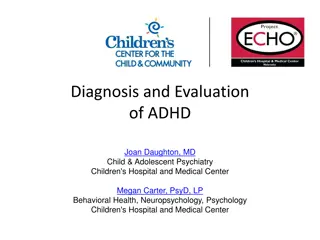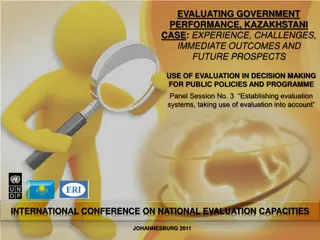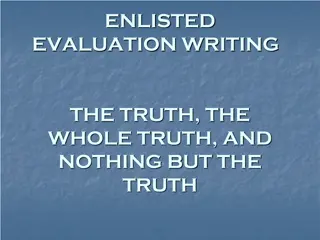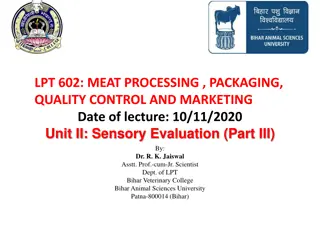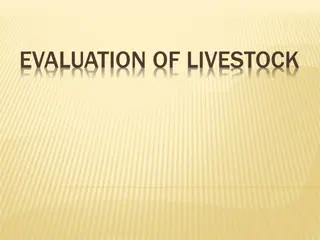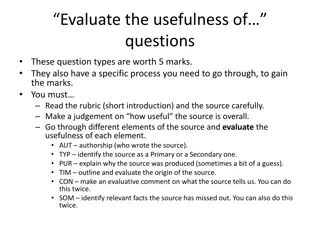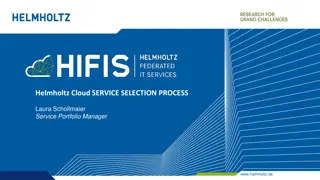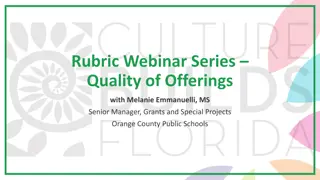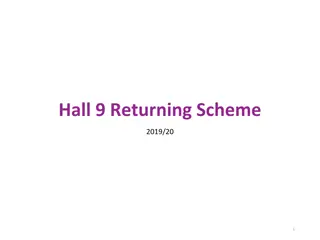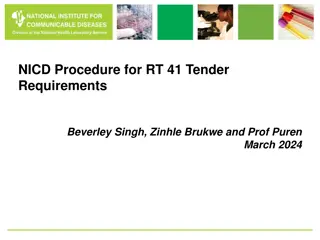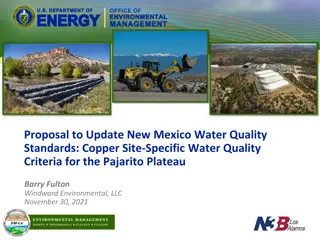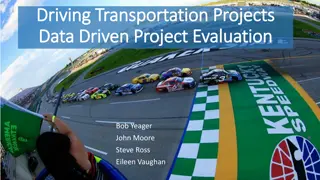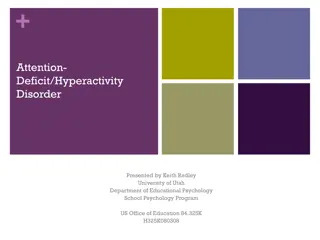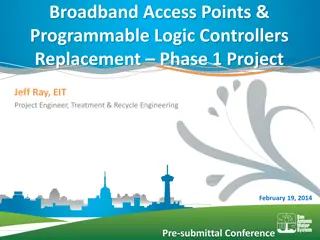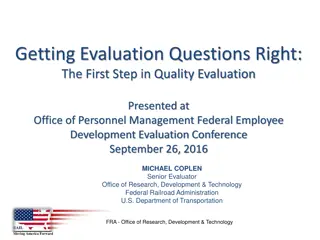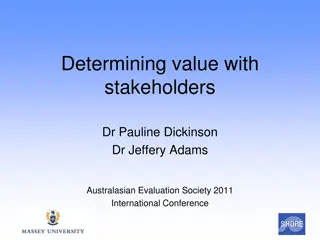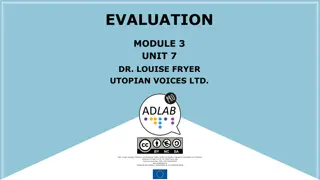Actions Emanating from the Evaluation of the Governance Reform
The evaluation of the governance reform within the WMO aimed to assess its alignment with strategic objectives, effectiveness in responding to societal needs, coordination efficiency, decision-making process, agility, and more. Evaluation criteria included relevance, design validity, effectiveness,
1 views • 13 slides
Comprehensive School Quality Assurance and Evaluation Process
A detailed insight into the Quality Assurance Department's role in school evaluation and improvement processes, including Whole School Evaluation (WSE), Follow-through initiatives, Teaching and Learning assessments, Resumption and Examination Monitoring. The process involves both internal self-evalu
0 views • 20 slides
Methods of Training Evaluation: Overview and Importance
Training and development are fast-growing fields globally, including in India. Evaluation plays a crucial role in understanding the effectiveness and efficiency of training programs for human resource development. This presentation covers the concept of training, evaluation strategies, methods/model
0 views • 61 slides
Universal Evaluation Framework: Simplifying Evaluation Processes
This session introduces the Universal Evaluation Framework (UEF) developed for evaluating QAA Scotland Enhancement Themes. Participants learn key evaluation questions, evidence capture, and the Theory of Change to enhance evaluation confidence. The QAA Scotland Evaluation Odyssey details historical
2 views • 14 slides
Understanding ADHD Diagnosis and Evaluation in Children and Adolescents
This resource provides valuable insights into the diagnosis and evaluation of ADHD in children and adolescents. It covers important diagnostic aspects, criteria from DSM-5 for inattention and hyperactivity-impulsivity, and outlines when to make a referral for a formal evaluation. The content sheds l
1 views • 18 slides
Implementing Blind Evaluation Pilot in HORIZON EUROPE: Key Facts and Process
HORIZON EUROPE is conducting a pilot on Blind Evaluation in the 2023-2024 work program to address biases in the research and innovation evaluation process. The pilot aims to assess the feasibility of blind evaluations in ensuring fairness and mitigating potential biases towards well-known organizati
9 views • 9 slides
Strengthening National Evaluation Capacity in the Era of Sustainable Development Goals
The presentation by Vijayalakshmi Vadivelu at the National Evaluation Capacities Conference 2017 in Istanbul focused on the importance of strengthening national evaluation capacity in alignment with the Sustainable Development Goals (SDGs). The content covers the holistic approach to national evalua
3 views • 18 slides
Exploring Developmental Evaluation for Better Decision-Making
Delve into the realm of developmental evaluation, focusing on its purpose, principles, and application in practice. Understand how developmental evaluation emphasizes real-time data collection for informed decision-making in complex systems. Learn about key principles such as developmental purpose,
0 views • 25 slides
Enhancing Government Performance Through Evaluation: The Kazakhstani Experience
Explore the journey of administrative reform in Kazakhstan initiated in 2006 to enhance government effectiveness. The ongoing evaluation system assesses six key areas, aiming to improve public service quality, state planning, and more. Key aspects include setting evaluation criteria, assessing insti
2 views • 18 slides
Evaluation Practices in Macedonia: What Works, What Doesn't
The comparison between the effectiveness of evaluation practices and the presence of formal institutions in Macedonia raises questions about the impact of institutional design on outcomes. While some countries with robust evaluation institutions fall short in practice, others lacking such structures
1 views • 7 slides
Enhancing Evaluation Capabilities in Mongolia for Agenda 2030
The Mongolian Evaluation Network in collaboration with UNDP is working to integrate the 2030 Agenda into national strategies and plans, establish institutional coordination mechanisms, align budgets, and enhance data monitoring systems. Key stakeholders including government agencies, NGOs, and inter
0 views • 9 slides
Understanding Demi-Regularity in Realist Evaluation
Realist Evaluation is a theory-driven approach focusing on understanding the context and mechanisms of action behind policies and interventions. This webinar explores the concept of demi-regularity in realist evaluation, its origins, and its application in analyzing complex evidence. Key aspects cov
1 views • 16 slides
A Comprehensive Guide to Enlisted Evaluation Writing
Unveiling the truth behind enlisted evaluation writing process, this guide delves into the mandatory requirements, promotion recommendation points, trait grades, and evaluation comments. From submission guidelines to performance assessment criteria, learn how to compile a thorough evaluation that ac
0 views • 36 slides
Understanding Evaluation in Education
Evaluation in education is a comprehensive term that encompasses measurement, testing, and qualitative examination of student behavior. It involves both quantitative and qualitative descriptions, along with value judgments. Differentiating from mere measurement, evaluation provides a deeper analysis
0 views • 28 slides
Sensory Evaluation in Meat Processing: Panelist Selection, Training, and Sample Preparation
The lecture covers the sensory evaluation process in meat processing, focusing on the selection and training of panelists based on criteria like willingness, capability, and general health. Panelists are categorized as trained or semi-trained, with detailed guidelines for preparing and presenting me
0 views • 8 slides
Sustainable Evaluation Systems Workshop Summary
Workshop on Sustainable Evaluation Systems by Stephen Porter at the NEC Conference focused on defining evaluation systems, addressing their failures, and emphasizing the importance of quality, use, and networks in achieving sustainability. Participants engaged in activities such as bingo card introd
0 views • 38 slides
Strategic Management: Strategy Review and Evaluation
This chapter delves into the critical process of strategy review, evaluation, and control in strategic management. It covers the nature of strategy evaluation, effective evaluation systems, contingency planning, auditing, using computers for evaluation, and guidelines for effective strategic managem
1 views • 42 slides
Livestock Evaluation and Cattle Market Priorities
In this visual guide, various aspects of livestock evaluation, focusing on cattle breeding, market priorities, muscle indicators, body parts of a cow, finish indicators, structural evaluation, rib and feeding ability assessment, and balance along with eye appeal considerations are discussed in detai
1 views • 65 slides
Evaluation of Source Usefulness through Multiple Criteria
In this evaluation task, you will assess the effectiveness of questions based on various criteria such as authorship, type of source, purpose, and relevance of information. By carefully analyzing the source content and rubric, you will provide an overall judgment on the source's utility while evalua
3 views • 10 slides
Understanding Evaluation and Ideology in Translation
Evaluation plays a crucial role in the study of translation, influencing both meaning and value in communication. This evaluation is reflected through language elements like accentuation, deletion, and substitution. Appraisal, stance, and evaluation are key terms in linguistic analysis that focus on
2 views • 22 slides
Impact and Evaluation Toolkit for Churches and Christian Charities
This toolkit aims to equip churches and Christian charities engaged in small-scale social action projects to think about impact, measure impact, choose data tools, reflect on evaluation data, and use it effectively. It covers principles of evaluation, setting objectives, selecting indicators, storyt
0 views • 34 slides
Evaluation Metrics for IEEE 802.11-14/0107 HEW Proposal
Evaluation metrics play a crucial role in assessing WLAN system performance and achieving the objectives of High Efficiency WLAN (HEW). This proposal by Yonggang Fang et al. from ZTE outlines the key evaluation metrics recommended for evaluating HEW performance, including area throughput, average th
0 views • 12 slides
Overview of Monitoring and Evaluation in the GEF
The Evaluation in the GEF and Training Module focuses on promoting accountability and learning within the Global Environment Facility (GEF) through monitoring and evaluation activities. The GEF Independent Evaluation Office plays a crucial role in assessing results, effectiveness, and performance of
0 views • 25 slides
HelmholtzCloud Service Selection Process Overview
The Helmholtz Cloud Service Selection Process is detailed through service surveys, iterations, criteria types, and exclusion processes. Service providers deliver data, weighting and selection criteria are applied, and candidate services are listed based on surveys and integrations. Criteria categori
0 views • 41 slides
Evaluation Criteria and Scoring Rubric for Arts and Culture Funding Applications
This document outlines the evaluation criteria and scoring rubric for funding applications in the arts and culture sector. It covers the quality of offerings, impact, track record, and other key aspects that will be assessed during the review process. Applicants must demonstrate the quality of their
0 views • 21 slides
Developing an Evaluation Work Plan for Effective Program Assessment
This presentation by Amy D. Andrade from San Jose State University focuses on developing an Evaluation Work Plan to identify responsibilities and timelines. It covers topics such as Evaluation Coaching Support, Webinar Outlines, Logic Model, Inputs-Outputs-Outcomes, Two Approaches to Evaluation, Pro
0 views • 29 slides
Nutrient Criteria Development Plan for High Rock Lake Summary Update
Nutrient Criteria Development in North Carolina has evolved through various stages since 2001, with the key milestones being the development of the Nutrient Criteria Implementation Plan in 2004 and the Nutrient Criteria Development Plan in 2014. The plan aims to link nutrient concentrations with the
0 views • 8 slides
Evaluation Synthesis in Changing Contexts: Enhancing Knowledge for Development Effectiveness
Evaluation synthesis is crucial for promoting learning, reflection, and decision-making in development work. This process involves bringing together diverse knowledge sources to generate strategic insights and facilitate wider use of evaluation findings. The Independent Office of Evaluation of IFAD
0 views • 20 slides
Returning Scheme and Criteria for Residence Recommendations
The Returning Scheme and Criteria for Residence Recommendations outline the key attributes, points allocation, and evaluation process for residents seeking to return to their hall. Points are awarded based on academic excellence, university contributions, hall-based activities, and discipline. The s
0 views • 20 slides
NICD Procedure for RT-41 Tender Requirements and Evaluation of HIV Rapid Test Kits
The NICD provides detailed tender requirements for professional kits and self-test kits to meet technical specifications. Suppliers must adhere to pre-screen suitability criteria, provide evidence of independent evaluation by recognized agencies, possess necessary certifications, submit regulatory v
0 views • 14 slides
Evaluation of FME Zero Emission Neighbourhoods in Smart Cities
The mid-term evaluation process of FME Zero Emission Neighbourhoods in Smart Cities involves self-evaluation, partner evaluation, and panel evaluation. The procedure includes scientific review, evaluation by scholars, and innovation assessment. Key documents like self-reports, progress reports, and
1 views • 20 slides
Overview of Regular Evaluation 2017 Findings in Estonia
In the Regular Evaluation 2017, efforts were made to maximize the benefits of evaluation outcomes for various stakeholders in Estonia such as the state, society, and institutions. The evaluation focused on a range of actions including preparing legislation, finding experts, creating self-report form
0 views • 6 slides
Proposal to Update New Mexico Water Quality Standards: Copper Site-Specific Water Quality Criteria for the Pajarito Plateau
Develop a proposal for the New Mexico Water Quality Control Commission to adopt EPA's 2007 recommended copper ambient water quality criteria, focusing on the history of U.S. EPA aquatic life criteria for copper, the use of the BLM tool in aquatic toxicology, and the overview of proposed site-specifi
0 views • 10 slides
Comprehensive Evaluation and Prioritization of Transportation Projects
This collection of images and information showcases a data-driven approach to evaluating transportation projects, focusing on congestion, benefit/cost analysis, safety, economic development, freight management, and asset management. The tiered prioritization system, workgroup collaboration, and proj
0 views • 11 slides
Comprehensive Guide to Training Evaluation Methods
This detailed guide covers the aim of evaluation, evaluation methods, techniques of evaluation, types of evaluation (formative, process, outcome, impact), and the significance of formative and process evaluation in assessing training effectiveness. Learn about the key principles and practices involv
0 views • 45 slides
Understanding ADHD Subtypes and Diagnosis Criteria in DSM-IV-TR
ADHD, as defined in the DSM-IV-TR, encompasses three subtypes: Predominantly Inattentive Type, Predominantly Hyperactive-Impulsive Type, and Combined Type. To meet diagnostic criteria for each subtype, specific symptoms must be present for a certain duration and at a degree that is maladaptive. Indi
0 views • 23 slides
Broadband Access Points & Programmable Logic Controllers Replacement Phase 1 Project Overview
This project overview provides details of the Broadband Access Points & Programmable Logic Controllers Replacement Phase 1 Project led by Jeff Ray, EIT Project Engineer at Treatment & Recycle Engineering. It includes information on the pre-submittal conference, RFQ schedule, evaluation criteria, and
0 views • 13 slides
Understanding Evaluation Questions for Quality Assessment in Federal Programs
Presentation by Michael Coplen at the Office of Personnel Management Federal Employee Development Evaluation Conference focused on the importance of developing quality evaluation questions, common flaws, and driving actionable evaluation by using evidence and rigorous criteria. The session highlight
0 views • 35 slides
Understanding the Value and Importance of Stakeholder Engagement in Evaluation
Exploring the concept of value in evaluation, this content delves into determining worth and quality through systematic processes. It highlights the significance of values in assessing success, discussing various methods for determining value and identifying criteria for evaluation. The activities a
0 views • 17 slides
Evaluation Criteria and Best Practices for Audio Description in Modern Languages Studies
Evaluation criteria and best practices for Audio Description (AD) in modern languages studies are outlined in this comprehensive content. It covers the purpose of AD, types of evaluation (formative and summative), training for AD students and professionals, embedded evaluation, Schjoldager criteria,
0 views • 18 slides




